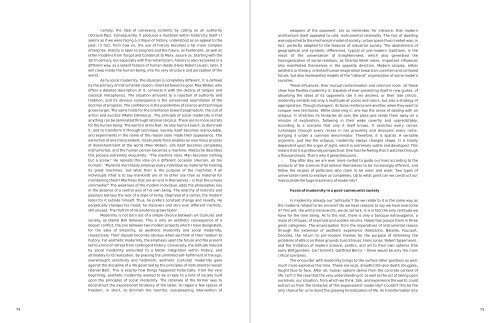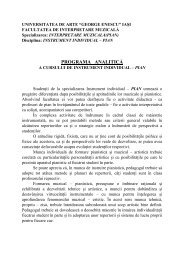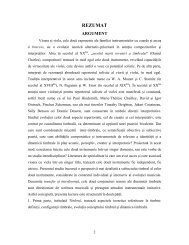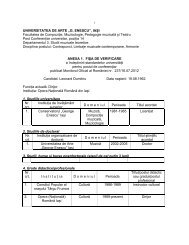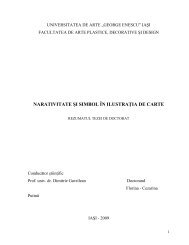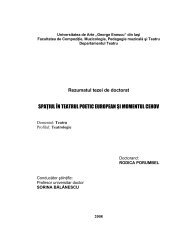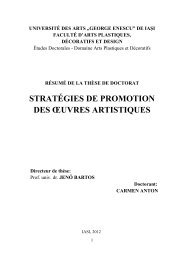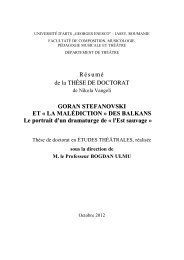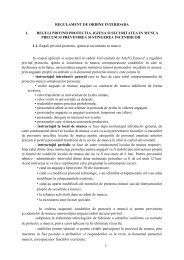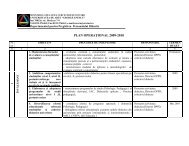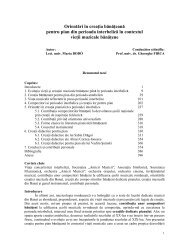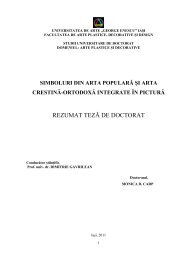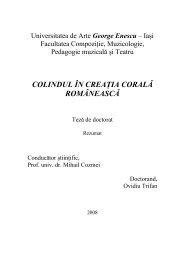vector 2_1.cdr - Universitatea de Arte "George Enescu"
vector 2_1.cdr - Universitatea de Arte "George Enescu"
vector 2_1.cdr - Universitatea de Arte "George Enescu"
Create successful ePaper yourself
Turn your PDF publications into a flip-book with our unique Google optimized e-Paper software.
namely, the i<strong>de</strong>a of conveying contents by calling on an authority<br />
(Octavio Paz). Consequently, it produces a mutation within historicity itself. It<br />
seems as if we were facing a critique of history, un<strong>de</strong>rstood as an appeal to the<br />
past. In fact, from now on, the use of history becomes a far more complex<br />
enterprise. History is open to progress and the future, as Fontenelle, as well as<br />
other mo<strong>de</strong>rns from Turgot and Condorcet to Marx, assure us. Starting with the<br />
18-th century, but especially with the romanticism, history is also recovered in a<br />
different way, as a salient feature of human <strong>de</strong>eds (Hans Robert Jauss); later, it<br />
will creep insi<strong>de</strong> the human being, into his very structure and perception of the<br />
world.<br />
As to social mo<strong>de</strong>rnity, the situation is completely different. It is <strong>de</strong>fined<br />
by the primacy of instrumental reason, oriented toward a goal. Max Weber, who<br />
offers a <strong>de</strong>tailed <strong>de</strong>scription of it, connects it with the <strong>de</strong>cline of religion and<br />
classical metaphysics. The situation amounts to a rejection of authority and<br />
tradition, and its obvious consequence is the unreserved assimilation of the<br />
doctrine of progress. The confi<strong>de</strong>nce in the possibilities of science and technique<br />
grows larger. The same holds for the orientation toward pragmatism, the cult of<br />
action and success (Matei Călinescu). The principle of social mo<strong>de</strong>rnity is that<br />
anything can be dominated through rational calculus. There are no more secrets<br />
for the human being. The world is at his feet: he only has to know it, to dominate<br />
it, and to transform it through technique. Society itself becomes manipulable,<br />
and experiments in the name of the reason soon ma<strong>de</strong> their appearance. The<br />
extinction of any transcen<strong>de</strong>nt, incalculable force enables an enormous process<br />
of disenchantment of the world (Max Weber). Life itself becomes completely<br />
instrumental, and the human person becomes a machine. Nietzsche <strong>de</strong>scribes<br />
this process extremely eloquently: “The machine rules. Man becomes nothing<br />
but a screw.” He repeats this i<strong>de</strong>a on a different occasion (Human, all too<br />
human): “Mankind mercilessly employs every individual as material for heating<br />
its great machines: but what then is the purpose of the machines if all<br />
individuals (that is to say mankind) are of no other use than as material for<br />
maintaining them? Machines that are an end in themselves – is that the umana<br />
commedia?” The weakness of the mo<strong>de</strong>rn individual, adds the philosopher, lies<br />
in the absence of a central axis of his own being. The anarchy of instincts and<br />
passions betrays the lack of a style of living. Deprived of a center, the mo<strong>de</strong>rn<br />
looks for it outsi<strong>de</strong> himself. Thus, he prefers constant change and novelty. He<br />
perpetually changes his mood; he discovers and stirs ever different instincts,<br />
still unused. The rhythm of his existence grows faster.<br />
Mo<strong>de</strong>rnity is not born out of a simple divorce between art (culture) and<br />
society, as Daniel Bell believes. This is only an aesthetic consequence of a<br />
<strong>de</strong>eper conflict, the one between two mo<strong>de</strong>rn projects which I have <strong>de</strong>signated,<br />
for the sake of simplicity, as aesthetic mo<strong>de</strong>rnity and social mo<strong>de</strong>rnity,<br />
respectively. Their dispute becomes obvious when we think of their relation to<br />
history. For aesthetic mo<strong>de</strong>rnity, the emphasis upon the future and the present<br />
led to a kind of retreat from contingent history. Conversely, the attitu<strong>de</strong> induced<br />
by social mo<strong>de</strong>rnity amounted to a better integration within history, and<br />
ultimately to its realization. By praising the unlimited self-fulfillment of the ego,<br />
overwrought sensitivity and hedonism, aesthetic (cultural) mo<strong>de</strong>rnity goes<br />
against the discipline of a life governed by the principles of instrumental reason<br />
(Daniel Bell). This is exactly how things happened historically: from the very<br />
beginning, aesthetic mo<strong>de</strong>rnity wanted to be a reply to a kind of society built<br />
upon the principles of social mo<strong>de</strong>rnity. The rationale of the former was to<br />
<strong>de</strong>construct the expansionist ten<strong>de</strong>ncy of the latter, to regain a few spaces of<br />
freedom, in short, to diminish the harmful, overpowering intervention of<br />
weapons of the opponent. Let us remember, for instance, that mo<strong>de</strong>rn<br />
architecture itself appealed to cold, instrumental rationality. The fact of dwelling<br />
was subjected to the mechanical mo<strong>de</strong>l of society; urban space thus created was, in<br />
fact, perfectly adapted to the features of industrial society. The abolishment of<br />
geographical and symbolic differences, typical of pre-mo<strong>de</strong>rn traditions, is the<br />
result of the universalism of Enlightenment, which also generated the<br />
homogenization of social relations, as Chantal Béret notes. Important influences<br />
also manifested themselves in the opposite direction. Mo<strong>de</strong>rn utopias, either<br />
aesthetic or literary, oriented human imagination toward an uncertain and confused<br />
future, but also represented mo<strong>de</strong>ls of the “rational” organization of some mo<strong>de</strong>rn<br />
societies.<br />
These influences, their mutual contamination and common roots all these<br />
show how flexible mo<strong>de</strong>rnity is. Capable of ever presenting itself in new guises, of<br />
absorbing the i<strong>de</strong>as of its opponents (be it les anciens, or their late critics),<br />
mo<strong>de</strong>rnity exhibits not only a multitu<strong>de</strong> of voices and colors, but also a strategy of<br />
appropriation. Though divergent, its faces reinforce one another, when they want to<br />
conquer new territories. While observing it, one has the sense of <strong>de</strong>aling with an<br />
octopus. It stretches its tentacles all over the place and sends them away on a<br />
mission of exploration, following in their wake covertly and unpredictably,<br />
according to a scenario that only it itself knows. It searches every corner,<br />
rummages through every recess in her proximity and discovers every niche,<br />
bringing it un<strong>de</strong>r a common <strong>de</strong>nominator. Therefore, it is spatial. A versatile<br />
organism, just like the octopus, mo<strong>de</strong>rnity always changes shape. It is totally<br />
<strong>de</strong>pen<strong>de</strong>nt upon the organ of sight, which is extremely subtle and <strong>de</strong>veloped. This<br />
means that it is profoundly perspectival. One has the feeling that it watches through<br />
a thousand eyes. That is why it generates panic.<br />
Day after day, we are ever more invited to gui<strong>de</strong> our lives according to the<br />
products of the sciences that believe themselves to be increasingly efficient, and<br />
follow the recipes of politicians who claim to be wiser and wiser. Two types of<br />
universalism tend to enslave us completely. Up to what point can we construct our<br />
lives outsi<strong>de</strong> the huge machinery of mo<strong>de</strong>rnity?<br />
Faces of mo<strong>de</strong>rnity in a post-communist society<br />
Is mo<strong>de</strong>rnity already our “antiquity”? Do we relate to it in the same way as<br />
the mo<strong>de</strong>rns related to les anciens? Do we have reasons to say we have overcome<br />
it? This will, the will to transcend it, we do not lack. It is in fact the only certitu<strong>de</strong> we<br />
have for the time being. As to the rest, there is only a baroque extravagance, a<br />
maze of critiques, of reversals and sud<strong>de</strong>n returns. Habermas groups them in three<br />
great categories. The emancipation from the imperatives of instrumental reason<br />
through the extension of aesthetic experience (Nietzsche, Bataille, Foucault,<br />
Derrida), the return to pre-mo<strong>de</strong>rn themes for the purpose of rethinking the<br />
problems of ethics on these grounds (Leo Strauss, Hans Jonas, Robert Spaemann),<br />
and the limitation of mo<strong>de</strong>rn science, politics, and art to their own spheres (the<br />
early Wittgenstein, Carl Schmitt, Gottfried Benn) – these would be only the main<br />
critical scenarios.<br />
The encounter with mo<strong>de</strong>rnity brings to the surface other positions as well,<br />
much more explosive this time. These are local, dreadful life-and-<strong>de</strong>ath struggles,<br />
fought face-to-face. After all, human options <strong>de</strong>rive from the concrete context of<br />
life. Isn't it the case that the very un<strong>de</strong>rstanding of, as well as the act of taking upon<br />
ourselves, our situation, from which we think, talk, and experience the world, could<br />
extract us from the tentacles of this expansionist mo<strong>de</strong>rnity? Couldn't this be the<br />
only chance for us to resist the growing formalization of life, its transformation into<br />
74 75


